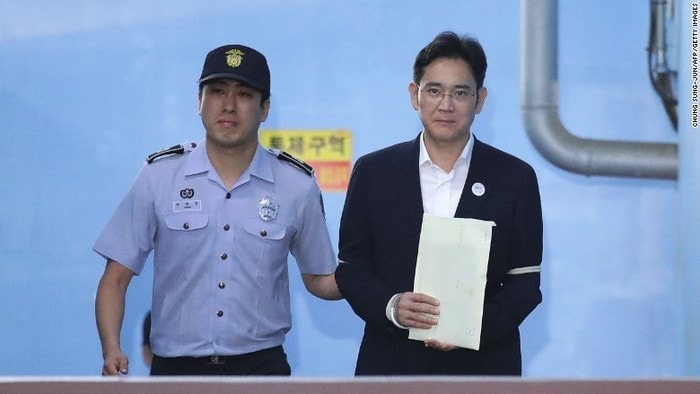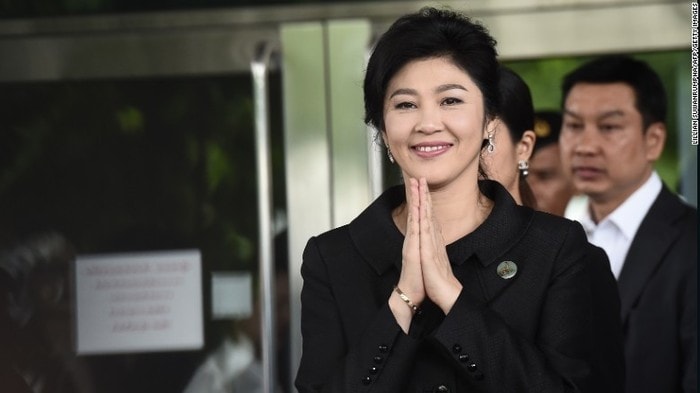The World This Week: Power and Sin
(Baonghean) - Last week, world public opinion paid much attention to developments surrounding two trials of figures who have held and are holding political and economic power in various countries.
However, while the Samsung Group heir will appeal the five-year prison sentence related to the scandal that shook the kimchi country, the other trial had to be postponed to another day because of the sudden disappearance of the defendant - Thailand's first female and youngest Prime Minister Yingluck Shinawatra.
 |
| Samsung Group heir Lee Jae-yong leaves court on August 25. Photo: AFP |
Scandal from the tablet
On August 25, Lee Jae-yong - the heir to the Samsung Group was sentenced to five years in prison for bribery and corruption, adding to the list of names involved in a scandal that has rocked South Korea, reshaped political activities and disrupted the country's elite, even overshadowing concerns about North Korea's missile threats.
It all started when Choi Soon-sil’s tablet fell into the hands of the press, and they soon discovered evidence that Choi, a close friend and informal adviser to then-South Korean President Park Geun-hye, had received confidential documents and interfered in the country’s affairs. Although she never held any official position, sources revealed that Choi Soon-sil had prior access to speeches and other documents from the Blue House owner.
This shocking discovery led to a Seoul court sentencing Ms. Choi to three years in prison in June for obstructing the execution of official duties by using her influence to “profit” her daughter’s academic achievements at Ewha University. Two university officials were also sentenced to 18 and 24 months in prison, respectively.
After Choi Soon-sil’s lucky star faded, her “protector” and South Korea’s first female president also suffered a similar fate. Despite the bitter winter cold, hundreds of thousands of South Koreans took to the streets to demand Park’s ouster. After months of trying to calm the situation with television appearances, vague apologies, and expressions of remorse for “causing concern to the people,” Park was impeached by the South Korean National Assembly in December last year with 234 votes in favor and 56 against.
On March 10, the country's Supreme Court upheld the impeachment, effectively ending Park's political career and sparking massive celebrations in Seoul. Two months later, prosecutors opened an investigation into allegations of corruption, coercion, and leaking classified information. The former South Korean president has denied the charges, but the public is still waiting for a final verdict in October.
However, a major political storm in Seoul split Park's Saenuri Party, with conservatives losing ground and eventually giving way to liberal reformer Moon Jae-in, who took power in May.
For the Korean people, corruption is a top concern during every election, many people do not hesitate to point out the close relationship between members of the country's political elite and the chaebols - large family-run corporations such as Samsung or Lotte that have a significant influence on the Korean economy.
The scandal that brought down Park and Choi has also quickly swept through these businesses, and senior executives from both conglomerates have been brought to justice. Lotte chairman Shin Dong-bin was charged with bribery in April, and most recently, Samsung Group heir Lee Jae-yong received a five-year prison sentence. Prosecutors described Lee as a cunning tycoon who knew exactly what he was doing when Samsung spent tens of millions of dollars on entities linked to a close friend of Park. Lee has denied any wrongdoing, and his lawyers have said he will appeal.
Previous efforts to crack down on corruption involving chaebols have been met with limited success due to lenient sentencing or political amnesties, but during his election campaign, current South Korean President Moon Jae-in promised to be realistic, emphasizing “the importance of establishing fairness under the law” for all South Korean citizens.
 |
| Former Thai Prime Minister Yingluck Shinawatra greets supporters as she leaves the Supreme Court on July 21. Photo: AFP |
Former Thai Prime Minister on the run?
After being ousted in a military coup in 2014, former Prime Minister Yingluck Shinawatra has been banned from leaving Thailand without court approval since 2015. She could face up to 10 years in prison for negligence in a rice subsidy scheme that cost the country billions of dollars.
The rice subsidy program, introduced in 2011, promised to pay farmers higher prices than the market. Critics say it was a waste of public funds to appease rural voters, hurt exports, and left the government with surplus rice reserves that it had to sell at a loss. Yingluck has insisted the rice subsidy program “benefits farmers and the country,” and that claims that it has cost money are false and fueled by those with political leanings against her.
In 2016, she pledged to attend the entire trial and not leave the country, but a few days ago, many media outlets reported that a high-ranking source in the Pheu Thai party revealed that Ms. Yingluck had left Thailand and gone to Dubai two days before the country's court issued a verdict on the rice subsidy case.
The source confirmed that Ms. Yingluck left on August 23 and is now “safe and sound” in Dubai, although she was supposed to appear in court on August 25. At the hearing, Yingluck’s lawyer said she was sick, but could not produce a doctor’s certificate. The explanation was rejected, and the Thai Supreme Court issued an arrest warrant for the woman and postponed the trial to September 27.
This raises many questions in public opinion, whether Yingluck has "followed in the footsteps" of her brother Thaksin - also a former Prime Minister of Thailand and currently living in exile in Dubai or London to avoid being charged with corruption.
Responding to press interviews, Thai police still affirmed that there was no official record proving that Ms. Yingluck had left, but it was “possible” that she had fled through a natural border area to a neighboring country.
It is clear that Ms. Yingluck’s mysterious disappearance is a “big surprise” to most Thais and will make the country’s military government more “enthusiastic,” according to political scientist Thitinan Pongsudhirak of Chulalongkorn University. However, this expert also affirmed that there is little possibility of unrest in Thailand after this information, but perhaps as a precaution, the police force has deployed 3,000 people to protect in case of protests.
Thu Giang
| RELATED NEWS |
|---|
